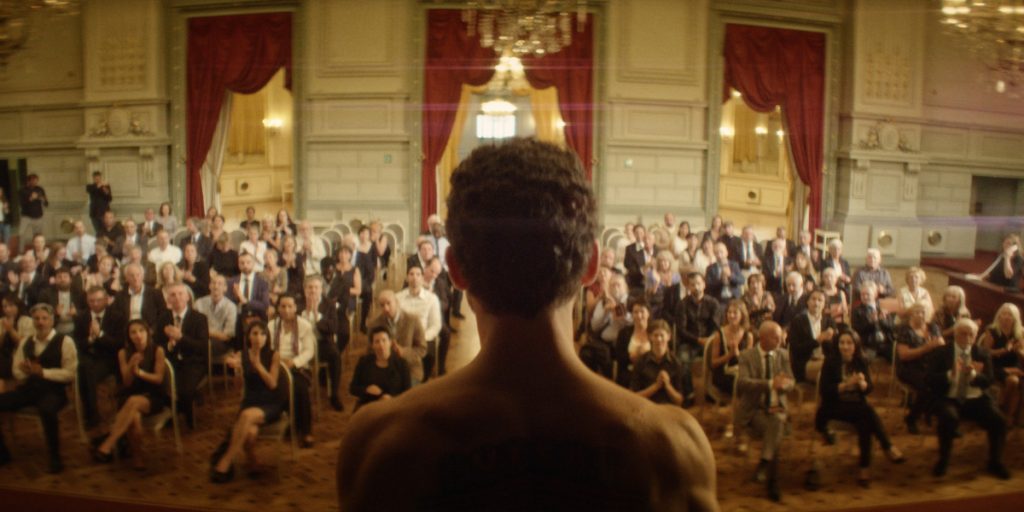The Man Who Sold His Skin explores the ugly treatment of humans for the sake of art and power, and a man who risks trading his soul alongside his skin.
Written and directed by Tunisian filmmaker Kaouther Ben Hania, The Man Who Sold His Skin centers around Sam Ali (Yahya Mahayni), a Syrian refugee forced to leave his country and his fiancé Abeer (Dea Liane). In order to get the money and legal status needed to travel back to her, Sam accepts a deal with an artist in Lebanon to have the skin on his back tattooed with an art piece, essentially becoming a museum exhibition himself. Not only does this force him to deal with the dehumanization that comes with such an arrangement, but things get even more complicated when he learns that Abeer has already been forced to marry another man.
The Man Who Sold His Skin had its World premiere at the 77th Venice International Film Festival in 2020 and its UK premiere at the Edinburgh Film Festival last night. It’s already been nominated for several awards, including the Oscar for Best International Feature Film earlier this year. Having now seen the film myself, it is certainly worthy of those accolades. This is an excellently crafted film that effectively touches upon issues of systemic oppression and the exploitation of people for selfish or political gain.
One of the first things you’ll likely notice when watching The Man Who Sold His Skin is Christopher Aoun’s cinematography, and how frequently it makes use of reflections and duplicate images of characters, most often Sam. This is visually very striking and eerie, and Aoun finds creative ways to keep implementing such techniques without making them stale.These include tricking you into thinking a reflection is the actual person, simultaneously showing the monitor of a filming camera alongside what it’s filming, and angling a shot to make only one character’s reflection visible when they’re speaking with another character. These choices also enhance the theme of characters being seen as merely images of themselves, or they can symbolize the ever-increasing blur of where the real human being is.
The powers that be don’t treat Sam and Abeer with respect as free people, just skins and visages on a canvas to do with as their agendas or desires dictate. This dehumanization builds as the film goes along, creating and spreading rifts between loved ones and reducing these people down to what the landscapes and systems want them to be. You can correlate the objectification here to any number of other situations in any environment, whether they be political, social, economic, or artistic.
People use each other all the time, stripping away the identities of individuals. As The Man Who Sold His Skin illustrates, even if there are arrangements in place that seem to benefit all parties, the further such arrangements play out, the more you realize that they ultimately just further enforce the power structures already in place. When Sam decides to sell his skin and endure the artist’s demands, he may think he’s getting closer to getting what he wants, but he’s really sold himself to the whims of those who put him in his position in the first place.

However, what we actually see in Sam’s case specifically doesn’t seem quite as disheartening as you may think. Going into The Man Who Sold His Skin, I was imagining the objectification of his body to go much further than what ends up happening, something that would have shocked and appalled everyone watching. I’m not at all saying that I know how far the psychological damage of even just this can go – especially considering the story was based on real events – but I think the movie could have done a slightly better job at showing just what would have made this situation so demoralizing to someone, or at least given us a better look into the crooked art world we see.
Thankfully, the overall effect of what Sam goes through is still gotten across by other means, namely the performances. Yahya Mahayni is perfect in conveying just how bitter and sick his character feels over everything, with Dea Liane playing off that with a greater tinge of sadness over how she’s being controlled. Having a romantic relationship be such a core part of this story could have backfired by reducing the impact of the bigger issues at play, but it works really well here because it was the central driving force of Sam’s initial decision to sell his skin, and the degree to which they love each other is believable. Their relationship is the heart of the movie, and it’s difficult to watch it be strained and nearly torn apart like this.
The Man Who Sold His Skin is an assured production that you should definitely keep your eye on, if the recognition it has received thus far hasn’t gotten your attention already. While having less bite than I would have hoped, it still successfully gets across everything it wants to say and makes excellent use of the filmmaking talents behind it. Check it out when you can, and see what makes this story more than skin-deep.
The Man Who Sold His Skin is now available to watch on digital and on demand.

